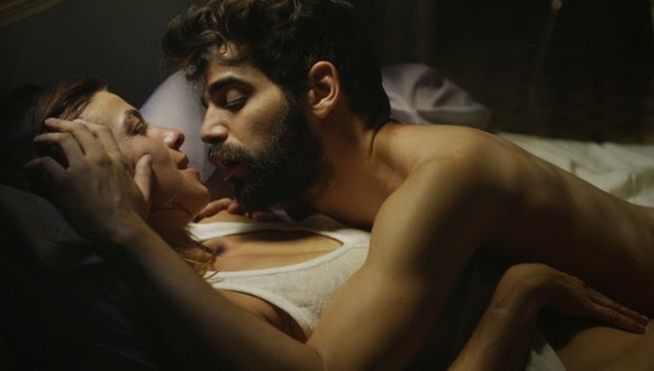 Back to selection
Back to selection
Hive Minds and Solitary Settings: BAMcinemaFest’s Sixth Edition
 10,000 KM
10,000 KM A carefully curated round-up of the festival circuit’s notable American titles, BAMcinemaFest begins its sixth edition today with the New York premiere of Richard Linklater’s Boyhood. Though the program is designed to favor nascent talent — Spike Lee, Les Blank and other repertory screenings aside — it’s hard to think of a more exemplary opener than this American independent masterwork. As a narrative experiment, Boyhood is every bit as unparalleled as you’ve heard, elevating its seemingly generic arc with moments of searing veracity. Given the holistic scope, I would wager that any viewer is bound to encounter a mirror image demanding of introspection and a helping side of tears.
Not all of the festival’s inclusions scrape away at the reality of our existence: Lev Kalman and Whitney Horn’s L For Leisure tips the scales, mining artifice for genuine comic effect. In this aesthetically driven debut, a collection of stuffy graduate students gather for sporadic, international vacations, while staving off life’s less decadent realities. Part hazy ’90s throwback, part satirical island hopping after school special, L For Leisure is the niche, brazenly original Rotterdam representative amongst the Sundance-SXSW heavy lineup. Which is not to discredit the more recognizable names.
Amir Bar-Lev’s Happy Valley is the definitive Jerry Sandusky scandal doc that intelligently forgoes a head-on examination of its subject for the tidal wave that rocked the Penn State community as a result. Electing to consider this collective crisis through the dismantling of iconic head coach and all around “good guy” Joe Paterno allows Bar-Lev to play with the audience’s perception of right and wrong. While his interviews with Paterno’s biographer, family members and devotees probe, Bar-Lev is also not afraid to observe: the removal of Paterno’s campus statue carries a weight heavier than any protest.
A fellow Sundance title that more resolutely places its confidence in silence is the Zellner Brothers’ Kumiko, The Treasure Hunter. Locating piercing heartbreak at the root of a possible urban legend, Rinko Kikuchi stars as the solitary Tokyo secretary who flees Japan for the American Midwest. Lured by the fictitious treasure Steve Buscemi’s character buries beneath a snowbound fence in Fargo, Kumiko displays a topical obsession with escapism and media, one that the Zellners cleverly hit upon through a transitional sequence from VHS to DVD. An idiosyncratic brew of adventure and observation as captured by the talented d.p. Sean Porter (It Felt Like Love), Kumiko is a breed all her own.
A justifiably favorite topic of today’s young filmmakers is Technology with a capital T: the mediator and, depending on whom you ask, interruptor of our interpersonal relationships. Frequent as its depiction may be, few convey its role as effectively as Carlos Marques-Marcet’s intelligent debut 10,000 KM. You may have heard that the film opens with a 23-minute one-take (kudos to d.p. Dagmar Weaver-Madsen), which serves to illustrate the last moment of unbroken proximity Alex and Sergi will share as a couple. But 10,000 KM doesn’t really take off until the two are begrudgingly Skyping across the titular divide from Los Angeles to Barcelona. In a stunning jaunt, related through a series of photographs, Marques-Marcet takes his female protagonist to Silicon Valley. As Alex considers the concrete slabs and abandoned parking lots that are home to modern technology’s pre-eminent puppet masters, Marques-Marcet accomplishes what so many contemporaries neglect to do by situating personal strife in a macro context. This is low-budget filmmaking at its most economical and inventive: two apartments, two actors, two computers, and, despite the odds, it is endlessly engrossing.
